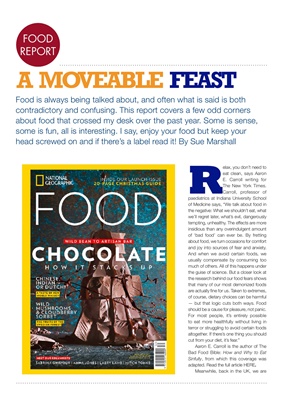
LIVINGLIVING
A MOVEABLE FEAST
Food is always being talked about, and often what is said is both
contradictory and confusing. This report covers a few odd corners
about food that crossed my desk over the past year. Some is sense,
some is fun, all is interesting. I say, enjoy your food but keep your
head screwed on and if there's a label read it! By Sue Marshall
F
elax, you don't need to
eat clean, says Aaron
E. Carroll writing for the
New York Times. Carroll,
professor of paediatrics
at Indiana University School of Medicine
says, "We talk about food in the
negative: What we shouldn't eat, what
we'll regret later, what's evil, dangerously
tempting, unhealthy. The effects are
more insidious than any overindulgent
amount of 'bad food' can ever be. By
fretting about food, we turn occasions
for comfort and joy into sources of
fear and anxiety. And when we avoid
certain foods, we usually compensate
by consuming too much of others. All of
this happens under the guise of science.
But a closer look at the research behind
our food fears shows that many of our
most demonized foods are actually fine
for us. Taken to extremes, of course,
dietary choices can be harmful - but
that logic cuts both ways. Food should
be a cause for pleasure, not panic.
For most people, it's entirely possible
to eat more healthfully without living
in terror or struggling to avoid certain
foods altogether. If there's one thing you
should cut from your diet, it's fear."
Aaron E. Carroll is the author of The
Bad Food Bible: How and Why to Eat
Sinfully, from which this coverage was
adapted. Read the full article HERE.
FOOD
REPORT